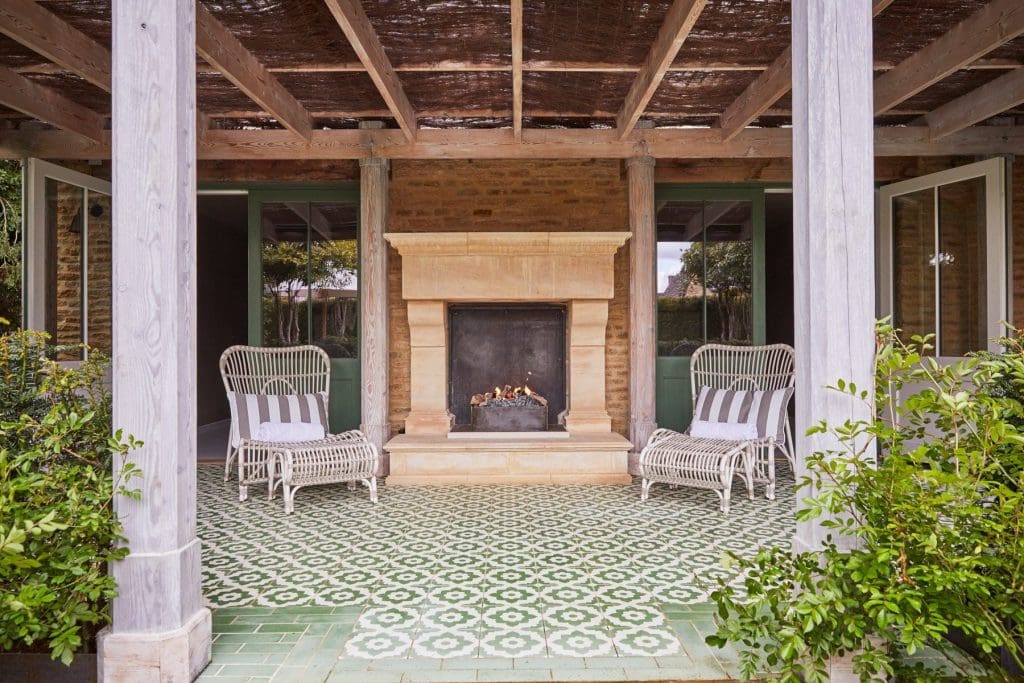Roger Hermiston and Eileen Wise travel to the Cotswolds to slow down at the Thyme Hotel.
There’s a sense of timelessness as you journey to Gloucestershire’s Thyme country house hotel and its accompanying 150-acre estate. After wending your way through the lush green hills of the Cotswolds, you enter the pretty village of Southrop with its eternal honey stone houses, before the final drive to Thyme’s entrance, passing a splendid flock of Black Welsh Mountain sheep grazing serenely in the field alongside.
Take away the car and you can imagine that little has altered in this landscape since medieval times, when the weaving trade brought the area the great wealth that still permeates it today. Well, actually the sheep have changed – back in the 14th century these particular pastures were inhabited by the sturdy Cotswold Lion, whose golden fleece matched the colour of the cottages.
For Caryn Hibbert, Founder and Creative Director of Thyme, the play on the word neatly reflects the ethos of this unique place. ‘We want guests to slow down, to take their time, to enjoy themselves in a place of relaxation and reflection. But thyme is of course a beautiful culinary herb, and food is at the very heart of what we do’.
Thyme Food School – Field to Fork
Indeed, before the Hibbert family decided to transform their historical estate (manor house, barns, piggery and much else) into luxury accommodation and facilities, a renowned cookery school came first.
The Thyme Food School – the reconstructed estate’s ‘founding ingredient’ – operates from two kitchens in an extension behind a superbly preserved 17th-century tithe barn. For a couple of decades now its students, initially just family and friends, have drawn on herbs from Thyme’s productive kitchen garden, together with the animals from the farm (pigs, chicken, sheep), to put into practice the estate’s ‘field to fork’ philosophy.
But the cookery school was only the start. Caryn and her family began to visualise their estate – it was a monastery back in the 16th century, then after dissolution the property of Robert Cecil, Queen Elizabeth I’s ‘Prime Minister’ – as a ‘village within a village’ (the latter being the adjoining Southrop). They set out to restore the manor house, adjacent cottages, and assorted barns into a vibrant working community and desirable holiday destination.
The Hibberts still oversee events from their vantage point at Southrop Manor, the family home, but for guests Thyme’s grounds include 32 bedrooms, a self-catering cottage (‘Old Walls’), the Thyme restaurant in a massive former ox barn, a tithe barn for private events, an extensive spa, a spring water swimming pool and tennis court. In addition a balcony room and piggery boutiques sell the estate’s beautifully designed Bertioli (named after Caryn’s father Michael, a renowned physicist and engineer) silk wear, tableware and bespoke homeware.
The Swan, Southrop
And just recently there has been a significant new addition with the re-opening of the Southrop pub, The Swan, just a short stroll from Thyme’s front door. On a cold but sunny day, the eve of the ‘Big Freeze’, it was there that we headed first for lunch before we checked into our estate room.
The earliest record of The Swan dates back to 1606 when Cecil, 1st Earl of Salisbury, still lived in the Southrop/Thyme manor house (just a year after he unraveled the Gunpowder Plot for James 1). Then the pub was the Bakehouse, serving bread and ale to his lordship’s farmworkers.
Now it’s a welcoming hostelry, with low slung ceilings and roaring fires, decked out in assorted quality wooden furniture combined with bright stripes and Thyme’s trademark Bertioli fabrics. The eclectic range of paintings on the walls are intriguing, supplied by local artists invited to showcase their work here.
At our table in the corner close to the fire we were served excellent winter fare – pumpkin soup and baked cheese soufflé, followed by pork belly, mash and cabbage, and Jerusalem artichoke risotto. Suitably fortified, we crossed the road and prepared to take temporary possession of our garden room, ‘Dandelion’.
Thyme Hotel
All the bedrooms at Thyme are named after plants and flowers and have the colours to match. Ours was naturally a (subtler) shade of yellow, featuring an immensely comfortable king-sized bed, two relaxing armchairs, sizeable freestanding roll-top bath and impressive waterfall shower. Top marks too for the reading lights on either side of the bed, which sadly few elite hotel rooms provide.
On warmer days the Dandelion’s little private garden (equipped with fire pit) would be a good place to sit and read. But we were keen to explore the myriad of buildings nearby so we headed back to reception, and from there into the Baa room.
Baa room Bar
The latter takes its name, as do all on the Thyme estate, from its original function as a lambing shed. True to the spirit of the place there are Black Welsh mountain sheep dotted around – not live ones, but their browny-black fleeces adorning lifesize models designed as comfortable double seats.
The Baa is indeed a bar, but also a lounge with sprawling armchairs and a library, all in all a relaxing central hub at Thyme. Passing through it and you’re now into the world of excellent craftsmanship in the Thyme boutique with lovely pastoral, botanically designed items – cushions, table linens, placemats, aprons, glassware and books. The estate’s unique Bertioli beauty products are also on show.
The Hibberts want Thyme to be a venue for artists, painters, and sculptors to display their talents and talk about their work, and their ‘Happenings’ calendar is usually filled up. Justine Picardie, novelist, fashion writer and biographer was a recent lecturer, and on our visit The Tithe Barn was hosting an exhibition of ceramics by the Somerset potter Richard Pomeroy, the room full of beautifully-coloured ceramic pots, mugs and beakers.
Thyme Restaurant – Ox Barn
From the boutique we headed into the Ox Barn for dinner. In the cozy fireside seating area our eyes were drawn to a print of the extraordinarily intimate 2004 portrait by Chris Levine of the late Queen Elizabeth II, Her Majesty with eyes closed as she rested between sessions.
Majestic indeed is this room, once resounding to the sound of the stamping of hooves and the mooing of restless beasts, now alive with the noise of the bustle in the open kitchen and the quieter tinkling of glasses and the murmur of satisfied voices at the tables.
The cavernous, high-beamed space hosts breakfast and dinner for over 60 covers, with 30 on the outside terrace in warmer times. The mastermind here is Chief Director Charlie Hibbert, Caryn’s son, who spent time at the famed Ballymaloe Cookery School in Ireland before developing his skills at London’s legendary Quo Vadis restaurant.
Charlie and his staff forage, pick and gather from all over the abundant land and garden at Thyme. The essentially English dinner menu changes daily, very much dependent on what is available in the vegetable garden on that particular day.
For our main choices we opted for the vegetarian option – celeriac, kale, chestnuts, mushroom and sage – and the venison, with cimi de rapa, pear and hazelnut. Both tasted fresh and delicious, washed down by an excellent dry white wine.
Thyme Hotel Spa
Like everywhere in Thyme its Meadow Spa has been developed to the highest standard. The claim that it is a ‘haven of restorative calm’ is certainly matched by the experience. From the moment you walk through the door you instinctively feel you are in for a real treat.
Eileen enjoyed one of their “Rituals” treatments – a wonderfully firm and dreamy massage, during which she also learned the importance of breathing techniques to help her relax. The scent of the Bertioli Meadow Spa oils used in the treatment was subtle and induced a mellow feeling of wellbeing.
After the pleasure of the massage, she was able to relax in a comfortable cushioned chair with footstool and gaze out at the peaceful gardens through the window, sipping a tasty and refreshing herbal tea.
Shaped by Nature
The motto, the ethos of Thyme is that it is ‘shaped by nature’. The Hibberts are passionate about sustainability, and conserving the exceptional environment that surrounds them. Leading much of this work is Caryn’s daughter Camilla (‘Milly’), General Manager, who enthuses about the projects with which the estate is involved.
Its water meadows are a Site of Special Interest (wild orchids abound), and Thyme is officially part of an AONB (Area of Outstanding Natural Beauty). Walks for guests are delightful and can be memorable – otters have been spotted along the banks of the River Leach. Milly also works closely on conservation projects with the British Trust for Ornithology, the latest tracking the arrival of the cuckoo (April 22 this year) and its subsequent fate.
High Thyme To Do Good
Thyme is a member of the ‘One Per Cent For The Plant’ global organisation, donating that amount of their annual turnover to protect wild spaces and wild species. ‘We are proud to be part of the ‘Golden Thread’, connecting to the rest of the world in environmental concerns’, says Milly.
This destination is unique for the scale and variety of what it has to offer. The Hibbert family have clearly developed their estate with great skill and attention to detail – and no less passion. This is a little world of its own into which you can very happily disappear for a few days, emerging refreshed and reinvigorated.
Thyme Cotswolds
Thyme Southrop Manor Estate , Southrop , Gloucestershire , GL7 3NX
T: 01367 850174
W: click here.

